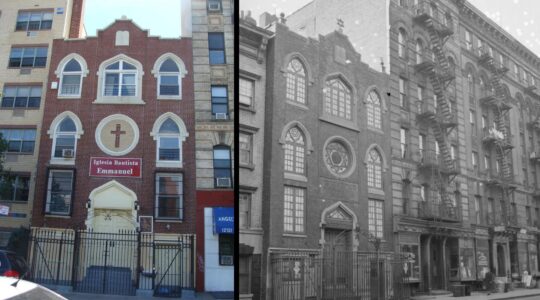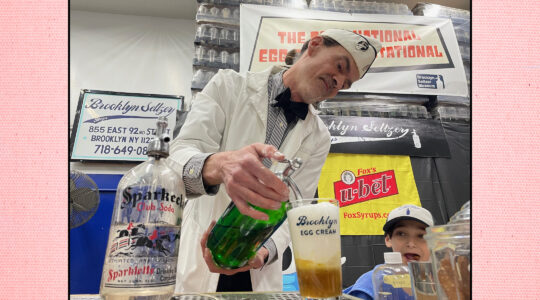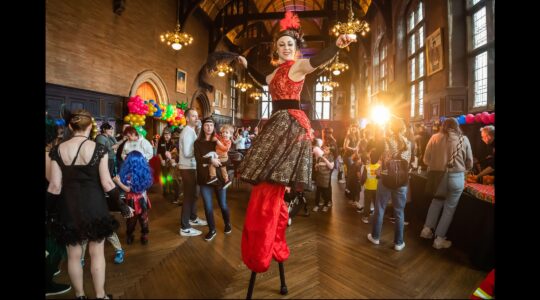Note: This is the first of three articles on this year’s N.Y. Jewish Film Festival.
Now in its 23rd year, the New York Jewish Film Festival, which opens on Jan. 8, is not only one of the oldest such events in the world, it is also becoming one of the biggest. With this year’s festival, the Film Society of Lincoln Center and The Jewish Museum are adding several sidebar events that will take them in some interesting new directions. Ultimately, what really matters is less the ambition of the programmers than the quality of the films they select.
Friedrich Durrenmatt, the Swiss playwright and novelist, has said, “Each art exploits the chances offered by its time, and it is hard to imagine a time without chances.” The same could be said of people who present the arts. Of course, film festivals can buttress themselves by drawing on known quantities. The N.Y. Jewish Film Festival has always been an excellent showcase for the restoration work of film archivists, most notably the National Center for Jewish Film; this year’s program is no exception, with NCJF’s latest Yiddish film revival, “Mamele,” a vehicle for the multitudinous talents of Molly Picon. Two other all-but-lost efforts from other archives are also scheduled: “Oded the Wanderer,” the first feature film made in the Yishuv, and “Professor Mamlock,” a 1938 Soviet film that was among the first to directly address Nazi anti-Semitism.
There will also be sidebar tributes to Otto Preminger, the brilliant graphic designer-filmmaker Saul Bass and Israeli-Dutch video artist Yael Bartana, plus a master class with Amos Gitai and a miniseries programmed by guest programmer Wim Wenders. This last event begins what is planned to be an ongoing addition to the festival with a world-class filmmaker showing one of his or her own works (this year a 30th anniversary screening of Wenders’ “Paris, Texas”) and two films that “relate to Jewish culture.”
All of these events are exciting. The archival programs are always among the festival’s highlights for this critic, and the new programs are very promising. But in the end, how you evaluate a film festival usually pivots on the new films it showcases. Inevitably, the quality of these films will vary, as will opinions about any one of them. But based on the strength of one film that will be screened next week, the 2014 festival will be well remembered.
Simply put, “Ain’t Misbehavin’,” the new feature by Marcel Ophuls, is a joyous return to the cinema for one of the greatest living documentary filmmakers in the world; it’s a memoir in movies that traces Ophuls’ life and career, along with a generous (in every sense) recounting of his fabled father’s life in film and some sideward glances at some of his own friends, most prominently Francois Truffaut, Jeanne Moreau, Frederick Wiseman and the photographer Elliott Erwitt.
In this, his first film in 18 years, Ophuls is almost never off-camera, delivering a witty, engaging monologue that moves through his life as “un voyageur” (the French title of the film). Although he has lived in France for much of his life, Ophuls has been buffeted by the winds of history that have swept Europe’s Jews across the globe. Of course, in his case, those winds were amplified and complicated by the workings of multiple film industries, as his father Max was shuffled from Germany to the Netherlands, Italy, France, the United States and back to France again, an odyssey that the son traces with copious well-chosen film clips.
Given the prominence of the workings of history in Ophuls’ films — both as influence and as subject matter — it seems ironic that “Ain’t Misbehavin’” is a personal memoir that really is firmly rooted in cinema, and that avoids dwelling in historical events. In addition to clips from his father’s magnificent oeuvre, he includes snippets from Capra, Truffaut, Preston Sturges, Wiseman, Antonioni, the Marx Brothers and his own work. There is a strong sense that, although Ophuls has frequently implied that he has always been a stateless person, his real home is Movieland.
What is most impressive — and admirable — about “Ain’t Misbehavin’” is its tone. Over the years, Ophuls has frequently been caustic and corrosively sarcastic, usually with considerable provocation. But this film (which feels too celebratory and downright funny to be valedictory) has a graceful equanimity that belies the powerful and often dark visions of such earlier works as “The Sorrow and the Pity,” “Hotel Terminus” and “The Memory of Justice.” Ophuls’ desperate battle to save that last film from its producers, so intense and fraught when it happened nearly 40 years ago, gets a surprisingly light-hearted backward glance today, typical of the rueful but contemplative and often humorous tone of much of the new film.
On the other hand, there are intimations of more ominous shadows in the filmmaker-journalist’s life. There are intimations in the film’s opening scenes of a severe marital rift that his neighbors seem to think included a physical altercation, but we have only Ophuls’ word for this. Marcel refers almost offhandedly to a series of suicide attempts in the wake of previous departures by Regine, his wife of over 50 years.
Yet the most obvious source of darkness, the Shoah, is seldom mentioned. In truth, as Ophuls himself says early in the film, for all the tragedies and setbacks his family endured in the 1930s and ’40s, he “had a privileged childhood — I was a privileged kid.” Is there a lingering air of self-doubt bred of survivor’s guilt? I don’t think so, and, on the evidence of “Ain’t Misbehavin’,” I’m fairly certain that Ophuls would say no, emphatically. Regardless of whatever sins Marcel Ophuls has committed in his personal life, as a witness to history and one of its most trenchant chroniclers, he has nothing to apologize for.
♦
The same could be justly said of the Jewish activists who fought for the freedom of their co-religionists in the former Soviet Union. The movement in support of Soviet Jews is one of the most admirable chapters in the long history of Jewish activism, and it has received suitably intelligent treatment in several documentaries. However, it has seldom been the subject of fiction films, so one approaches the festival’s opening night offering, “Friends from France,” with high hopes.
Regrettably, those hopes are quickly dashed. Directed and written by Anne Weil and Philippe Koltarski, “Friends from France” takes a couple of 20-year-old Jewish cousins from 1979 Paris to Moscow, where they engage in a series of maladroit covert attempts to aid their Russian counterparts. The parlous state of Russian Jewry takes a backseat to the soapy interactions between the French duo, and an epilogue set 20 years later feels even more like daytime TV drama. The film is a lost opportunity, slightly redeemed by Vladimir Fridman’s performance as an irascible victim of the Soviet state and Robert Marcel Lepage’s sinuous, intelligent music.
♦
Alan Zweig’s “When Jews Were Funny” puts us on more familiar ground, Jews and their (now ebbing) dominance of stand-up comedy Zweig has interviewed a fascinating collection of Jewish comics past and present, including Shelly Berman, Jack Carter, Shecky Greene, Howie Mandel, Judy Gold and Gilbert Gottfried trying to elicit their thoughts on the intersection of humor and suffering that is the Jewish experience. The film is a bit shapeless, and, if you are looking for laughs, you may be disappointed, but the discussion is surprisingly thoughtful and provocative. It’s worth watching just for Stewie Stone’s explanation of how you measured failure at the Concord.
The 23rd annual New York Jewish Film Festival opens on Jan. 8 and runs through Jan. 23. Most of the films will be screened at the Walter Reade Theater (165 W. 65th St.), with other events taking place at the Eleanor Bunin Munroe Film Center (144 W. 65th St.). For complete information, go to www.NYJFF.org.
The New York Jewish Week brings you the stories behind the headlines, keeping you connected to Jewish life in New York. Help sustain the reporting you trust by donating today.




